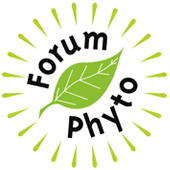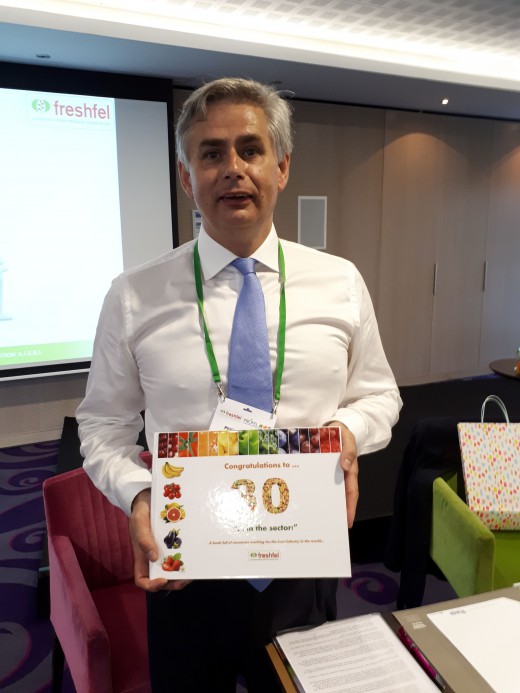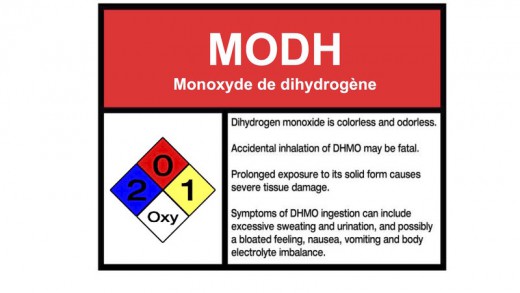
The 20th of June 2017 Freshfel AGM celebrated the 30 year work anniversary of Philippe Binard, General Delegate. He…

Sorry, this entry is only available in Français.
The 20th of June 2017 Freshfel AGM celebrated the 30 year work anniversary of Philippe Binard, General Delegate. He has been given a congratulation book with a lot of pictures and testimonies.
Quite emotional.

DHMO has already been a matter of campaigns, at little scale. We’ve already reported them here and here.
Now the Association for DHMO Ban has launched a petition on Change.org.
DHMO, DiHydrogen MonOxide is a colorless and odorless chemical compound.
It’s used as solvant, dilutant and coolant. It could be found in biopsies of pre-cancerous tumors and lesions. It is a known causative component in many thousands of deaths and is a major contributor to millions upon millions of dollars in damage to property and the environment.
For more information, there is also a DHMO Awareness facebook page and a DHMO Awareness site
In short, it’s time to définitely ban DHMO. And you can contribute by signing the petition.

That’s the title of this article (in English) : detailed, a bit long, but very clear. It’s on Thouhtscapism, a blog on science, creativity, environment, health, fiction by Iida Ruishalme, biologist.
Here is the presentation by The Risk Monger on his blog:
“It is a bit long but answers, very clearly and patiently, every question anyone with concerns about the continued use of this herbicide might have. If you are a journalist, please read this. If you are a policy-maker, please read this. If you are going to share an anti-GMO or anti-conventional farming meme, please read this. If you are going to the Monsanto Tribunal next month, … please learn to read!”
Worth reading.
Her 17 questions:
In “Myth busting: Are synthetic pesticides, used with some GMOs, more dangerous than natural ones?“, on Genetic Literacy, L Katiraee reminds us the Bruce Ames works in a clear and interesting way.
To go further:
““There’s No Such Thing as a Chemical-Free Lunch””
« Références sur résidus et sécurité des aliments »
« Les idées reçues : la tasse de café »
[1] Acronyme évitant de donner son nom barbare : 2,4-dihydroxy-7-méthoxy-1,4-benzoxazine-3-one
It’s a “Stuicide”. In this vidéo, a “stupid” guy drinks Glyphosate to show that it is non-toxic to humans at realistic concentrations. And in fact it’s not that stupid.
Don’t do that at home. But watch the video before making your mind.
– In Canada, free seeds to bring back the bees
– Glyphosate : EFSA answers the attacks
– “Amish use GMOs, pesticides yet cancer rates remain very low”
– Food risks : John Oliver mocks misleading science with Todd Talks
– To smile and think: “Salt, Vinegar, and Glyphosate”
– A new style for ForumPhyto
 In Canada, General Mills, owner of the Honey Nut Cheerios trademark, has decided to put away their bee-mascot from packaging for some weeks. This way, they aim to make their customers be aware of the massive bee death. They offer free wildflowers seeds to every Canadian to bring back the bees. Have a look to #bringbackthebees (in English) or…
In Canada, General Mills, owner of the Honey Nut Cheerios trademark, has decided to put away their bee-mascot from packaging for some weeks. This way, they aim to make their customers be aware of the massive bee death. They offer free wildflowers seeds to every Canadian to bring back the bees. Have a look to #bringbackthebees (in English) or…
 In November 2015, EFSA finalised the re-assessment of glyphosate, well-known active substance of Monsanto’s Roundup and other herbicides. Read EFSA press release, and detailed explanations on its risk assessment. The report concludes that glyphosate is unlikely to pose a carcinogenic hazard to humans and proposes a new safety measure that will tighten the control of glyphosate residues in food….
In November 2015, EFSA finalised the re-assessment of glyphosate, well-known active substance of Monsanto’s Roundup and other herbicides. Read EFSA press release, and detailed explanations on its risk assessment. The report concludes that glyphosate is unlikely to pose a carcinogenic hazard to humans and proposes a new safety measure that will tighten the control of glyphosate residues in food….
 The Amish, an insular people in the United States for nearly 200 years avoid modern technologies such as telephones, automobile, and even zippers. Many people think the Amish must also eschew genetically modified crops and pesticides. In addition, Amish are healthier than the rest of the US population. Their cancer rates are very low. So the anti-pesticides and anti-GMO…
The Amish, an insular people in the United States for nearly 200 years avoid modern technologies such as telephones, automobile, and even zippers. Many people think the Amish must also eschew genetically modified crops and pesticides. In addition, Amish are healthier than the rest of the US population. Their cancer rates are very low. So the anti-pesticides and anti-GMO…
 Most eat-this-don’t-eat-that studies are garbage, in the way that garbage could become a Dr. Oz endorsed superfood with a scientific study designed to generate the desired answer. John Oliver agrees on a sarcastic, hilarious AND serious talk-show on HBO. Barfblog, a reference blog in food safety, publishes a good written summary. It concludes “That’s where his idea for Todd…
Most eat-this-don’t-eat-that studies are garbage, in the way that garbage could become a Dr. Oz endorsed superfood with a scientific study designed to generate the desired answer. John Oliver agrees on a sarcastic, hilarious AND serious talk-show on HBO. Barfblog, a reference blog in food safety, publishes a good written summary. It concludes “That’s where his idea for Todd…
 A “homemade” herbicide recipe is floating around the web : salt, vinegar and dish soap. Many of you have probably seen it posted to Facebook or Twitter or Pinterest, or on your favorite home gardening site. Is it efficient, safe and cheap? That is the question Control Freaks, a Weed Science blog which is linked to USDA, answers to in…
A “homemade” herbicide recipe is floating around the web : salt, vinegar and dish soap. Many of you have probably seen it posted to Facebook or Twitter or Pinterest, or on your favorite home gardening site. Is it efficient, safe and cheap? That is the question Control Freaks, a Weed Science blog which is linked to USDA, answers to in…
 Our site appearance is changing, with 3 main objectives: – A clearer and more readable display – A more simple display for mobile terminals (smartphones and tablets) – In consequence, a better indexing on search engines Notinhing else has changed : every former address is still functional. Your remarks are welcome.
Our site appearance is changing, with 3 main objectives: – A clearer and more readable display – A more simple display for mobile terminals (smartphones and tablets) – In consequence, a better indexing on search engines Notinhing else has changed : every former address is still functional. Your remarks are welcome.
The Amish, an insular people in the United States for nearly 200 years, avoid modern technologies such as telephones, automobile, and even zippers. Many people think the Amish must also eschew genetically modified crops and pesticides.
In addition, Amish are healthier than the rest of the US population. Their cancer rates are very low. So the anti-pesticides and anti-GMO paranoïa is right? You get it all wrong…
On the opposite, in “Amish use GLOs, pesticides yet cancer rates remain low”, Genetic Literacy, a scientific pro-GMO website, demonstrates that Amish “use pesticides, and they use genetically modified crops in their fields. Enthusiastically.”
Moreover, “Amish farmers see organic as a new technology, and some are reluctant to adapt to it.”
Common sense get one thing right: Amish have indeed very low cancer rates. The main reasons are :
– Avoidance of tobacco
– Lifestyle : they are more active
– Observation bias due to their refusal of cancer screenings
– Endogamy which favorites genetic diseases, but also genetic advantages. It would be the main reason according to Genetic Literacy.
Main conclusion : keep away from common sense, it could be misconceptions…
Most eat-this-don’t-eat-that studies are garbage, in the way that garbage could become a Dr. Oz endorsed superfood with a scientific study designed to generate the desired answer. John Oliver agrees on a sarcastic, hilarious AND serious talk-show on HBO.
Barfblog, a reference blog in food safety, publishes a good written summary.
It concludes “That’s where his idea for Todd Talks comes in. “Do you love science in all its complexity but wish it could be a little less complex and a lot less scientific?” asks an announcer. “Introducing Todd Talks, where the format of Ted Talks meets the intellectual rigor of morning news shows.”
Highlights of the hilarious talks include warnings about chocolate — “Mmm. It will kill you,” says one pseudo scientist — and some intriguing if not alarming findings on alcohol — “And in my research I found out, red wine makes babies 20 percent more sociable,” explains another.”
Tous les articles récents édités par ForumPhyto.
Suivre l'évolution de la règlementation de la protection phytosanitaire.
Connaître les bonnes pratiques phytosanitaires et comprendre les enjeux.
Décrypter les actions médiatiques sur les questions phytosanitaires.
Comprendre les enjeux économiques et mondiaux de la protection phytosanitaire.
Tous les articles édités par ForumPhyto et classés par date.